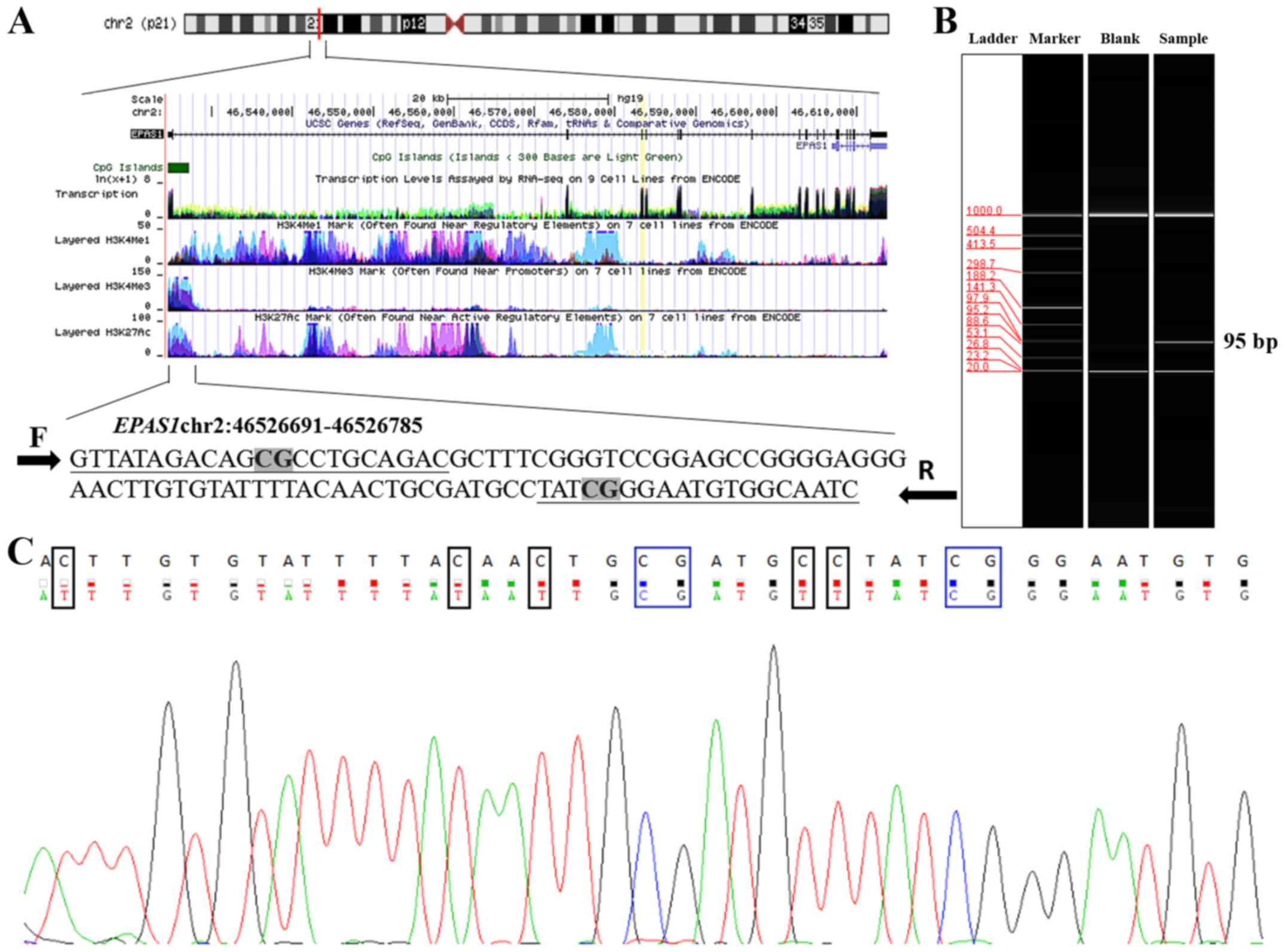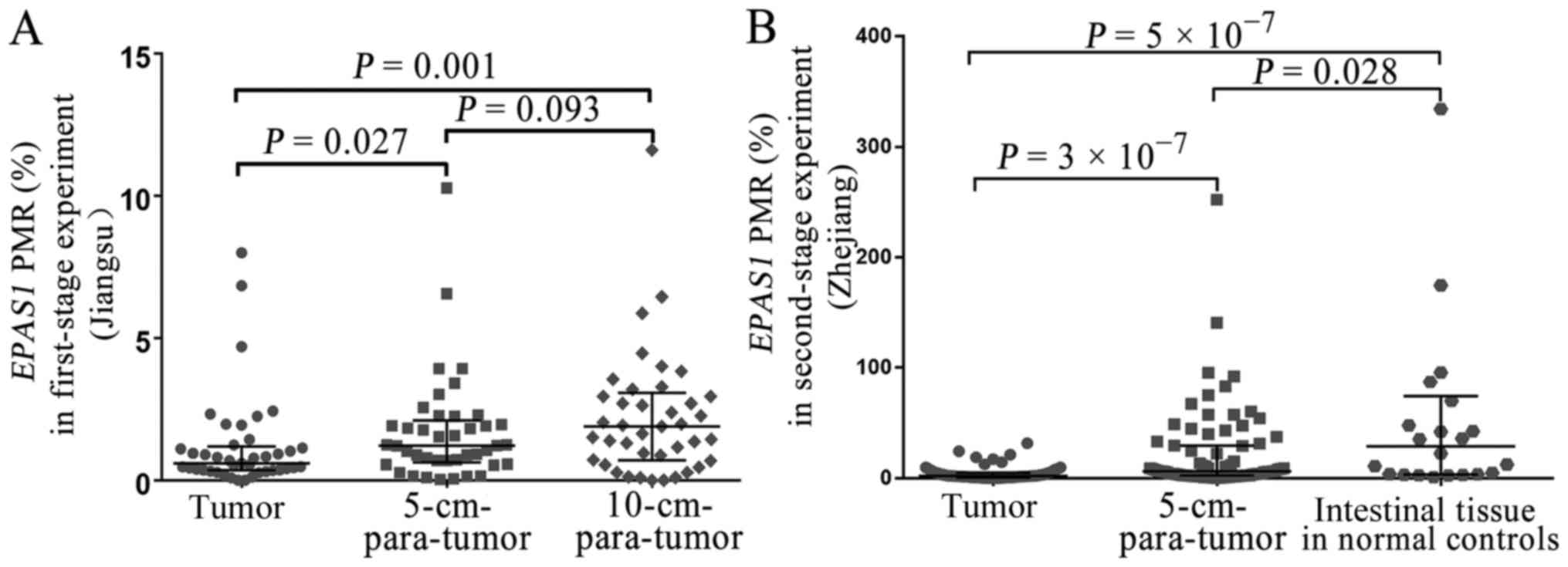|
1
|
Chen W, Zheng R, Baade PD, Zhang S, Zeng
H, Bray F, Jemal A, Yu XQ and He J: Cancer statistics in China,
2015. CA Cancer J Clin. 66:115–132. 2016. View Article : Google Scholar : PubMed/NCBI
|
|
2
|
Brenner H, Kloor M and Pox CP: Colorectal
cancer. Lancet. 383:1490–1502. 2014. View Article : Google Scholar : PubMed/NCBI
|
|
3
|
Carethers JM and Jung BH: Genetics and
genetic biomarkers in sporadic colorectal cancer. Gastroenterology.
149:1177–1190.e3. 2015. View Article : Google Scholar : PubMed/NCBI
|
|
4
|
Okugawa Y, Grady WM and Goel A: Epigenetic
alterations in colorectal cancer: Emerging biomarkers.
Gastroenterology. 149:1204–1225.e12. 2015. View Article : Google Scholar : PubMed/NCBI
|
|
5
|
Zhou D, Tang W, Su G, Cai M, An HX and
Zhang Y: PCDH18 is frequently inactivated by promoter methylation
in colorectal cancer. Sci Rep. 7:28192017. View Article : Google Scholar : PubMed/NCBI
|
|
6
|
Rezvani N, Alibakhshi R, Vaisi-Raygani A,
Bashiri H and Saidijam M: Detection of SPG20 gene
promoter-methylated DNA, as a novel epigenetic biomarker, in plasma
for colorectal cancer diagnosis using the MethyLight method. Oncol
Lett. 13:3277–3284. 2017. View Article : Google Scholar : PubMed/NCBI
|
|
7
|
Li W, Zhang X, Lu X, You L, Song Y, Luo Z,
Zhang J, Nie J, Zheng W, Xu D, et al: 5-Hydroxymethylcytosine
signatures in circulating cell-free DNA as diagnostic biomarkers
for human cancers. Cell Res. 27:1243–1257. 2017. View Article : Google Scholar : PubMed/NCBI
|
|
8
|
Rawłuszko-Wieczorek AA, Horbacka K,
Krokowicz P, Misztal M and Jagodziński PP: Prognostic potential of
DNA methylation and transcript levels of HIF1A and EPAS1 in
colorectal cancer. Mol Cancer Res. 12:1112–1127. 2014. View Article : Google Scholar : PubMed/NCBI
|
|
9
|
Tian H, McKnight SL and Russell DW:
Endothelial PAS domain protein 1 (EPAS1), a transcription factor
selectively expressed in endothelial cells. Genes Dev. 11:72–82.
1997. View Article : Google Scholar : PubMed/NCBI
|
|
10
|
Robins JC, Akeno N, Mukherjee A, Dalal RR,
Aronow BJ, Koopman P and Clemens TL: Hypoxia induces
chondrocyte-specific gene expression in mesenchymal cells in
association with transcriptional activation of Sox9. Bone.
37:313–322. 2005. View Article : Google Scholar : PubMed/NCBI
|
|
11
|
Yoshimura H, Dhar DK, Kohno H, Kubota H,
Fujii T, Ueda S, Kinugasa S, Tachibana M and Nagasue N: Prognostic
impact of hypoxia-inducible factors 1alpha and 2alpha in colorectal
cancer patients: Correlation with tumor angiogenesis and
cyclooxygenase-2 expression. Clin Cancer Res. 10:8554–8560. 2004.
View Article : Google Scholar : PubMed/NCBI
|
|
12
|
Tanigawa N, Amaya H, Matsumura M, Lu C,
Kitaoka A, Matsuyama K and Muraoka R: Tumor angiogenesis and mode
of metastasis in patients with colorectal cancer. Cancer Res.
57:1043–1046. 1997.PubMed/NCBI
|
|
13
|
Putra AC, Eguchi H, Lee KL, Yamane Y,
Gustine E, Isobe T, Nishiyama M, Hiyama K, Poellinger L and
Tanimoto K: The A Allele at rs13419896 of EPAS1 is associated with
enhanced expression and poor prognosis for non-small cell lung
cancer. PLoS One. 10:e01344962015. View Article : Google Scholar : PubMed/NCBI
|
|
14
|
Iwamoto S, Tanimoto K, Nishio Y, Putra AC,
Fuchita H, Ohe M, Sutani A, Kuraki T, Hiyama K, Murakami I, et al:
Association of EPAS1 gene rs4953354 polymorphism with
susceptibility to lung adenocarcinoma in female Japanese
non-smokers. J Thorac Oncol. 9:1709–1713. 2014. View Article : Google Scholar : PubMed/NCBI
|
|
15
|
Xia G, Kageyama Y, Hayashi T, Kawakami S,
Yoshida M and Kihara K: Regulation of vascular endothelial growth
factor transcription by endothelial PAS domain protein 1 (EPAS1)
and possible involvement of EPAS1 in the angiogenesis of renal cell
carcinoma. Cancer. 91:1429–1436. 2001. View Article : Google Scholar : PubMed/NCBI
|
|
16
|
Cho H, Du X, Rizzi JP, Liberzon E,
Chakraborty AA, Gao W, Carvo I, Signoretti S, Bruick RK, Josey JA,
et al: On-target efficacy of a HIF-2α antagonist in preclinical
kidney cancer models. Nature. 539:107–111. 2016. View Article : Google Scholar : PubMed/NCBI
|
|
17
|
Sena JA, Wang L, Heasley LE and Hu CJ:
Hypoxia regulates alternative splicing of HIF and non-HIF target
genes. Mol Cancer Res. 12:1233–1243. 2014. View Article : Google Scholar : PubMed/NCBI
|
|
18
|
Welander J, Andreasson A, Brauckhoff M,
Bäckdahl M, Larsson C, Gimm O and Söderkvist P: Frequent
EPAS1/HIF2α exons 9 and 12 mutations in non-familial
pheochromocytoma. Endocr Relat Cancer. 21:495–504. 2014. View Article : Google Scholar : PubMed/NCBI
|
|
19
|
Baba Y, Nosho K, Shima K, Irahara N, Chan
AT, Meyerhardt JA, Chung DC, Giovannucci EL, Fuchs CS and Ogino S:
HIF1A overexpression is associated with poor prognosis in a cohort
of 731 colorectal cancers. Am J Pathol. 176:2292–2301. 2010.
View Article : Google Scholar : PubMed/NCBI
|
|
20
|
Favier J, Plouin PF, Corvol P and Gasc JM:
Angiogenesis and vascular architecture in pheochromocytomas:
Distinctive traits in malignant tumors. Am J Pathol. 161:1235–1246.
2002. View Article : Google Scholar : PubMed/NCBI
|
|
21
|
Collado M, Garcia V, Garcia JM, Alonso I,
Lombardia L, Diaz-Uriarte R, Fernández LA, Zaballos A, Bonilla F
and Serrano M: Genomic profiling of circulating plasma RNA for the
analysis of cancer. Clin Chem. 53:1860–1863. 2007. View Article : Google Scholar : PubMed/NCBI
|
|
22
|
Chen X, Yang Y, Liu J, Li B, Xu Y, Li C,
Xu Q, Liu G, Chen Y, Ying J and Duan S: NDRG4 hypermethylation is a
potential biomarker for diagnosis and prognosis of gastric cancer
in Chinese population. Oncotarget. 8:8105–8119. 2017.PubMed/NCBI
|
|
23
|
Li B, Chen X, Jiang Y, Yang Y, Zhong J,
Zhou C, Hu H and Duan S: CCL2 promoter hypomethylation is
associated with gout risk in Chinese Han male population. Immunol
Lett. 190:15–19. 2017. View Article : Google Scholar : PubMed/NCBI
|
|
24
|
Yang Y, Chen X, Hu H, Jiang Y, Yu H, Dai
J, Mao Y and Duan S: Elevated UMOD methylation level in peripheral
blood is associated with gout risk. Sci Rep. 7:111962017.
View Article : Google Scholar : PubMed/NCBI
|
|
25
|
Kristensen LS, Mikeska T, Krypuy M and
Dobrovic A: Sensitive melting analysis after real time-methylation
specific PCR (SMART-MSP): High-throughput and probe-free
quantitative DNA methylation detection. Nucleic Acids Res.
36:e422008. View Article : Google Scholar : PubMed/NCBI
|
|
26
|
Zhang Q, Lou Y, Zhang J, Fu Q, Wei T, Sun
X, Chen Q, Yang J, Bai X and Liang T: Hypoxia-inducible factor-2α
promotes tumor progression and has crosstalk with Wnt/β-catenin
signaling in pancreatic cancer. Mol Cancer. 16:1192017. View Article : Google Scholar : PubMed/NCBI
|
|
27
|
Cui J, Duan B, Zhao X, Chen Y, Sun S, Deng
W, Zhang Y, Du J, Chen Y and Gu L: MBD3 mediates epigenetic
regulation on EPAS1 promoter in cancer. Tumour Biol.
37:13455–13467. 2016. View Article : Google Scholar : PubMed/NCBI
|
|
28
|
Zhu DM, Li DC, Zhang ZX and Zhang XY:
Effect of endothelial PAS domain protein 1 and hypoxia inducible
factor 1alpha on vascular endothelial growth factor expression in
human pancreatic carcinoma. Chin Med J (Engl). 121:2258–2264.
2008.PubMed/NCBI
|
|
29
|
Talks KL, Turley H, Gatter KC, Maxwell PH,
Pugh CW, Ratcliffe PJ and Harris AL: The expression and
distribution of the hypoxia-inducible factors HIF-1alpha and
HIF-2alpha in normal human tissues, cancers, and tumor-associated
macrophages. Am J Pathol. 157:411–421. 2000. View Article : Google Scholar : PubMed/NCBI
|
|
30
|
Kim CM, Vocke C, Torres-Cabala C, Yang Y,
Schmidt L, Walther M and Linehan WM: Expression of hypoxia
inducible factor-1alpha and 2alpha in genetically distinct early
renal cortical tumors. J Urol. 175:1908–1914. 2006. View Article : Google Scholar : PubMed/NCBI
|
|
31
|
Lachance G, Uniacke J, Audas TE, Holterman
CE, Franovic A, Payette J and Lee S: DNMT3a epigenetic program
regulates the HIF-2α oxygen-sensing pathway and the cellular
response to hypoxia. Proc Natl Acad Sci USA. 111:7783–7788. 2014.
View Article : Google Scholar : PubMed/NCBI
|
|
32
|
Gordan JD, Bertout JA, Hu CJ, Diehl JA and
Simon MC: HIF-2alpha promotes hypoxic cell proliferation by
enhancing c-myc transcriptional activity. Cancer Cell. 11:335–347.
2007. View Article : Google Scholar : PubMed/NCBI
|
|
33
|
Kim WY, Perera S, Zhou B, Carretero J, Yeh
JJ, Heathcote SA, Jackson AL, Nikolinakos P, Ospina B, Naumov G, et
al: HIF2alpha cooperates with RAS to promote lung tumorigenesis in
mice. J Clin Invest. 119:2160–2170. 2009. View Article : Google Scholar : PubMed/NCBI
|
|
34
|
Franovic A, Holterman CE, Payette J and
Lee S: Human cancers converge at the HIF-2alpha oncogenic axis.
Proc Natl Acad Sci USA. 106:21306–21311. 2009. View Article : Google Scholar : PubMed/NCBI
|
|
35
|
Ravegnini G, Zolezzi Moraga JM, Maffei F,
Musti M, Zenesini C, Simeon V, Sammarini G, Festi D, Hrelia P and
Angelini S: Simultaneous analysis of SEPT9 promoter methylation
status, micronuclei frequency, and folate-related gene
polymorphisms: The potential for a novel blood-based colorectal
cancer biomarker. Int J Mol Sci. 16:28486–28497. 2015. View Article : Google Scholar : PubMed/NCBI
|
|
36
|
Huang J, Tan ZR, Yu J, Li H, Lv QL, Shao
YY and Zhou HH: DNA hypermethylated status and gene expression of
PAX1/SOX1 in patients with colorectal carcinoma. OncoTargets Ther.
10:4739–4751. 2017. View Article : Google Scholar
|
|
37
|
Li Y, Song L, Gong Y and He B: Detection
of colorectal cancer by DNA methylation biomarker SEPT9: Past,
present and future. Biomark Med. 8:755–769. 2014. View Article : Google Scholar : PubMed/NCBI
|
|
38
|
Peng HX, Yang L, He BS, Pan YQ, Ying HQ,
Sun HL, Lin K, Hu XX, Xu T and Wang SK: Combination of preoperative
NLR PLR and CEA could increase the diagnostic efficacy for I-III
stage CRC. J Clin Lab Anal. 31:2017. View Article : Google Scholar
|
|
39
|
Kinzler KW and Vogelstein B: Lessons from
hereditary colorectal cancer. Cell. 87:159–170. 1996. View Article : Google Scholar : PubMed/NCBI
|
|
40
|
Stella S, Bruzzese A and Chiarini S:
Biological bases of the colorectal adenoma-carcinoma sequence. G
Chir. 17:473–476. 1996.(In Italian). PubMed/NCBI
|
|
41
|
Takami K, Yana I, Kurahashi H and Nishisho
I: Multistep carcinogenesis in colorectal cancers. Southeast Asian
J Trop Med Public Health. 26 Suppl 1:S190–S196. 1995.
|
|
42
|
Wynter CV, Walsh MD, Higuchi T, Leggett
BA, Young J and Jass JR: Methylation patterns define two types of
hyperplastic polyp associated with colorectal cancer. Gut.
53:573–580. 2004. View Article : Google Scholar : PubMed/NCBI
|
|
43
|
Wang HL, Liu P, Zhou PY and Zhang Y:
Promoter methylation of the RASSF1A gene may contribute to
colorectal cancer susceptibility: A meta-analysis of cohort
studies. Ann Hum Genet. 78:208–216. 2014. View Article : Google Scholar : PubMed/NCBI
|
|
44
|
Wang YC, Yu ZH, Liu C, Xu LZ, Yu W, Lu J,
Zhu RM, Li GL, Xia XY, Wei XW, et al: Detection of RASSF1A promoter
hypermethylation in serum from gastric and colorectal
adenocarcinoma patients. World J Gastroenterol. 14:3074–3080. 2008.
View Article : Google Scholar : PubMed/NCBI
|
|
45
|
Li YW, Kong FM, Zhou JP and Dong M:
Aberrant promoter methylation of the vimentin gene may contribute
to colorectal carcinogenesis: A meta-analysis. Tumour Biol.
35:6783–6790. 2014. View Article : Google Scholar : PubMed/NCBI
|
|
46
|
Couraud S, Vaca-Paniagua F, Villar S,
Oliver J, Schuster T, Blanché H, Girard N, Trédaniel J,
Guilleminault L, Gervais R, et al: Noninvasive diagnosis of
actionable mutations by deep sequencing of circulating free DNA in
lung cancer from never-smokers: A proof-of-concept study from
BioCAST/IFCT-1002. Clin Cancer Res. 20:4613–4624. 2014. View Article : Google Scholar : PubMed/NCBI
|
|
47
|
Jung K, Fleischhacker M and Rabien A:
Cell-free DNA in the blood as a solid tumor biomarker-a critical
appraisal of the literature. Clin Chim Acta. 411:1611–1624. 2010.
View Article : Google Scholar : PubMed/NCBI
|


















